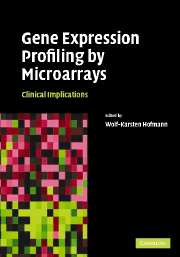Book contents
- Frontmatter
- Contents
- List of contributors
- Foreword
- Introduction
- 1 Technique of microarrays: microarray platforms
- 2 Quantitative quality control of microarray experiments: toward accurate gene expression measurements
- 3 Statistical analysis of gene expression data
- 4 Genomic stratification in patients with heart failure
- 5 Gene expression profiling for the diagnosis of acute leukemias
- 6 Gene expression profiling can distinguish tumor subclasses of breast carcinomas
- 7 Gene expression profiling in lymphoid malignancies
- 8 mRNA profiling of pancreatic beta-cells: investigating mechanisms of diabetes
- 9 Prediction of response and resistance to treatment by gene expression profiling
- Index
- References
9 - Prediction of response and resistance to treatment by gene expression profiling
Published online by Cambridge University Press: 05 September 2009
- Frontmatter
- Contents
- List of contributors
- Foreword
- Introduction
- 1 Technique of microarrays: microarray platforms
- 2 Quantitative quality control of microarray experiments: toward accurate gene expression measurements
- 3 Statistical analysis of gene expression data
- 4 Genomic stratification in patients with heart failure
- 5 Gene expression profiling for the diagnosis of acute leukemias
- 6 Gene expression profiling can distinguish tumor subclasses of breast carcinomas
- 7 Gene expression profiling in lymphoid malignancies
- 8 mRNA profiling of pancreatic beta-cells: investigating mechanisms of diabetes
- 9 Prediction of response and resistance to treatment by gene expression profiling
- Index
- References
Summary
Introduction
For many decades, drug therapy in medicine has been an empirical science, largely based on trial and error. Even today we cannot predict how effective a particular drug will be in an individual patient. To find the most suitable antihypertensive agent, for example, it may take more than one attempt. Often, only careful evaluation of a large number of clinical trials has enhanced treatment success and patient benefit.
Testing bacterial sensitivity towards antibiotic drugs (resistogram) was among the first attempts to a “proof of principle” before the onset of treatment. It is still an unsurpassed method for targeted antimicrobial therapy and a prime example of an educated approach to treatment.
With the possibility of evaluating the expression of thousands of genes at a time using commercially available or customized gene arrays and applying sophisticated statistical algorithms, a new era has dawned for prognostic assessment of diseases as well as for therapeutic implications. In treating infectious diseases, microarrays and mapping of single nucleotide polymorphisms (SNPs) have already enhanced drug discovery and understanding of resistance mechanisms [1–3]. However, all efforts to define gene expression profiles for disease are limited by available representative tissue samples. Although recently it has been shown that differentially expressed genes in heart failure patients can be found within white blood cells [4], progress is most pronounced in hematology and oncology.
Information
- Type
- Chapter
- Information
- Gene Expression Profiling by MicroarraysClinical Implications, pp. 212 - 237Publisher: Cambridge University PressPrint publication year: 2006
